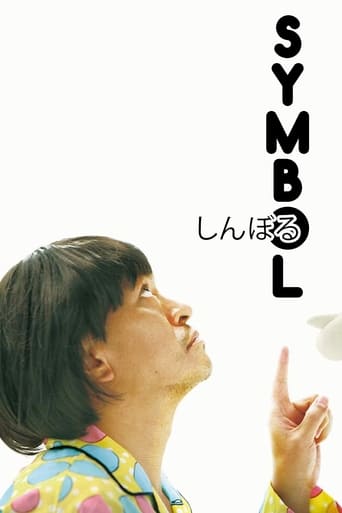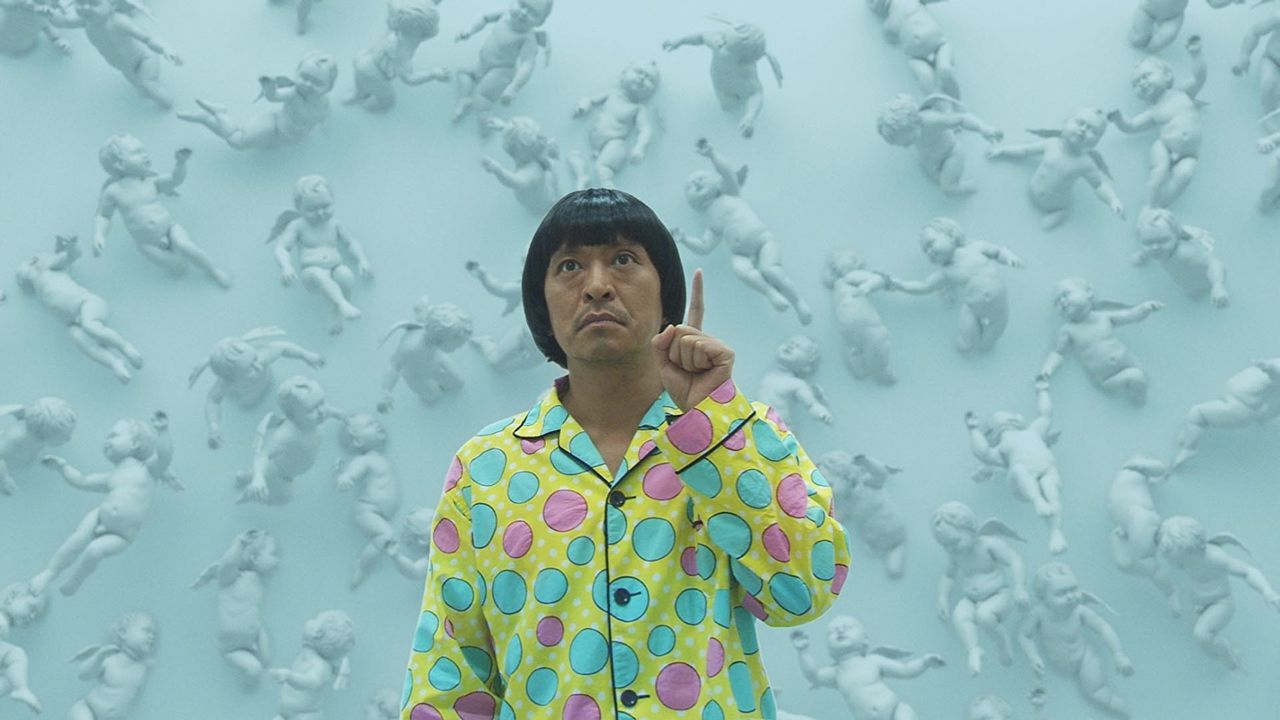FilmCuckoo
I picked originally this movie for watching, because of it's mystery, single room element, which has been covered so well over and over again, without much ingenuity or desire to create something new. Imagine my surprise, when I found this movie to be a guaranteed 100% cult classic masterpiece for the future. It is difficult to describe and analyse all the ingenious subtleties of this yet another wonderful piece of modern cinematic treasure, into which Japan's movie industry has been evolving for a number of years. Some of the most creative pieces of modern cinema have certainly come from Japan during the past 10 years or so.This movie is also weird, very weird in fact, no question about it. But it is so fabulously done, the jokes are funny, they are very funny. All that which shows us, this movie is not only brilliantly thought out, it is even more astonishingly executed, it is even more difficult to find any actual goofs from this one, (as it is from most Japanese movies) - Every single prop seems to be always in it's right place! There are way more thoughts and semantics in this movie, than just a few obscure references to the direction humanity is evolving into. The outline of a man trapped inside a room, which he is clearly destined to escape from, is only faintly veiled depiction of humanity itself, which is only given purpose by creating comedy, when seemingly random objects start popping out of the walls, if we bother to manipulate, or pull the "right" levers, as in life in itself in the real outside world. The comic slapstick routines which Hitoshi Matsumoto so superbly and funnily pulls off, are truly funny, obviously the work of a master comedian, who knows extremely well the physical side of comedy, as well as the importance of sounds, facial expressions, movements and timing. And while you're watching the movie unfold, you will most certainly notice that you will start yourself imagining the infinitely various ways how he could (or should) escape from the room, using the objects found in the room. And at the same time, you can only smile and laugh for how much fun and comedy one can pull from a bottle of soy sauce, toilet plunger, sushi and a hanging rope.The other worthy observation is the parallel story line, which from the outline has absolutely nothing to do with our antagonist in his bright white room, this fact is even underlined by showing us that it happens as far away from Japan as possible, in Mexico, in the world of Luchador wrestler's family and work place, the wrestling ring. Naturally this so far removed place, with its people who are so far removed from our antagonist, must somehow be tied together, at point which the movie evolves into completely different spheres, becoming more surreal and fantasy driven. The viewer however, is not left out in the cold, as if you were watching closely from the beginning, you will understand everything when the movie ends.What a brilliant, weird, intelligent, clever and hilarious movie!
George Antoniadis
Symbol is a wonderful tale of the harsh reality of life along a man's quest to reach absolution and his trail through life.The director uses explicit visual aids to guide us through the materialistic needs of an everyday Japanese man and the things he must do to acquire them by forfeiting his freedom. Following the path ofmaturity, he, whose name we will never learn reaches a point were mere material pleasure is not enough and needs to learn what it is like to be free. During this hard and long journey he will find himself doubting and forsaking everything. Only then will he be able toslide open the door to real freedom and find himself as a new god. But still unable to shed his true human skin, he will influence the lives of people whose existence he is not even aware of.Symbol is able to reach down and touch you in places that only religion was able to before. It is breathtaking up to the very last second.
eferoth
I'm baffled. You meet this kind of movie only very rarely.It defies attempts to categorize it. It destroys your preconceptions of what a "special" movie might be. There's slapstick and there's nonsense and there's meta babbling, except its wordless meta babbling. Also there's angel penises, like a lot of them. Seriously, this movie weirded me out.In itself the story moves in a pretty straight line. Well, two straight lines. There's the wrestler plot, and there's the white room plot. The wrestler plot is utterly forgettable and, frankly, quite boring. It just functions as the opposite of the white room. One of many incarnations of what opposite could mean in this case.The white room plot centers on a man trying to get out of the white room. Simple right? Pressing the angels penises (You heard me!) reveals certain, seemingly random, objects. In combination they might lead to an escape. Here the movie really shines. Through sometimes silly, sometimes clever trial and error means the protagonist starts coming up with an escape plan. I found myself thinking along with him (and normally being way ahead of him and getting frustrated with him... JUST USE THE POT!!!).In the end the two story lines meet to give the audience a bigger picture. The ending still came as a surprise, although, in hindsight, it makes complete sense. It leaves only one question, but I came up with an answer immediately. I think thats how its supposed to be. Not everyones answer will be the same, but there will be one. Perfect example of closure without closure.Watch this if you like to see special things, don't finish watching it if you're bored after the first white room scene. It probably won't be the movie for you.9/10 I subtracted one star because the effects in the final scene were so crappy that they really distracted me from fully enjoying the ending but that's probably just me and other people working in that field themselves. Nothing to cry over really.
Annie_Mah
When is a sub genre born? Does it simply derive from a formula or certain elements that are reused often enough? Or can it be a set of expectations you bring into the theater with you? I ask because Symbol seems to be deliberately riffing on all of these things, trying to find the line where familiar tropes become, well, symbols. It plays both with a familiar sub genre and a less-familiar setup that's on the verge of becoming a sub genre at this point; you could even argue that this is the movie that pushes it over.For most of its running time, Symbol seems to be two completely unrelated movies running parallel to each other. One is a Mexican Lucha Libre movie (or maybe "short film" is more appropriate, given the relatively small amount of running time it involves). It's perfectly conventionally shot and with a simple narrative; the wrestler Escargot Man prepares for a tag team match, while a kid in the audience cheers him on.The other storyline is deliberately, seemingly perversely different. A nameless Japanese man (comedian Hitoshi Matsumoto, who also wrote and directed) wakes up in a featureless white room about the size of a bachelor apartment, wearing a set of candy-colored pajamas and a ridiculous bowl cut. He has no idea how he got there. Exploring the room, he finds exactly one notable feature: a button on the wall shaped like, uh, male genitalia. Pressing it triggers an explosion of cherubs from the wall, who leave behind...more penis-shaped buttons. Pressing those buttons, in turn, triggers a bizarre and seemingly useless array of objects that come shooting out of the walls, along with other, generally disagreeable effects (like one which turns into a butt and farts toxic fumes at him). Eventually, though, some of the buttons start to reveal their potential usefulness in mounting an escape...except that whoever trapped him in this room seems determined to screw with his head.Believe it or not, all this weirdness turns out to be headed somewhere relatively straightforward. I mean, it's still a weird movie that I'm sure even Matsumoto wouldn't be able to explain completely, employing as it does Lynchian dream logic and a love of the absurd for the absurd's sake. But the two threads do end up coming together in a way that...well, "makes sense" might not be the way to put it, but they do come together to make a point. The movie makes an attempt at profundity near the end which is a lot more palatable for being weird and slightly inexplicable.Up until then, aside from the slight and seemingly straightforward Luchadore subplot, the movie is a one-man show. Matsumoto unfortunately depends a little too much on mugging and acting zanily idiotic--the character he's playing makes a number of choices that reveal him to be a dimbulb--but the situation is a natural one for humor, especially as the faceless forces that control the room seem to enjoy tormenting him. There's also a hilarious recurring sequence in which comic book panels narrate Pajamas Guy's various plans for escape while Matsumoto grooves out in the foreground. (And the narration is in English for some reason!) I'm not sure if "Shinboru" has some other shading of meaning that doesn't translate well into English--I'm assuming that the Symbol of the title refers to the little penis-buttons (yeah, I knew writing this review was going to be awkward), but it also seems to relate to the various motifs and elements we expect in a genre story, and the storyteller's attempt to break free of them. In that sense, this is an extremely meta movie. One thing's for sure, if the movie's about helping to define genres, than its clearly staking out a patch of ground under "bizarre Japanese mindfu**".


 AD
AD

